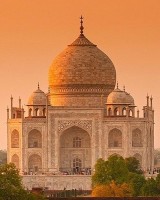Private guides and guided tours in Korea North
Private guides in Korea North
Private Guide in Pyongyang - North
(Member Since 2009) Excursions/tous in the following cities: Pyongyang Languages: EnglishWe offer more than tours to the DPRK or a simple North Korea Travel Guide. Our aim is to promote tourism in the DPRK around the world in order to increase the number of people visiting this unique country and...

Korea North
Language: Korean
Currency: North Korean won (KPW)
Calling Code: +850
CAPITAL CITY OF Korea North: Pyongyang
LANGUAGE OF Korea North: Korean
CURRENCY OF Korea North: North Korean won (KPW)
COMMENTS ABOUT Korea North:
North Korea is a country in Eastern Asia.
Cities : P'yŏngyang, Kaesong, Wonsan, Nampo
Best Places : Kumgangsan, Myohyangsan, Paekdusan, Panmunjom
Electricity : 220V/50Hz (European plug)
Calling Code : +850
Time Zone : UTC +9
An independent kingdom under Chinese suzerainty for most of the past millennium, Korea was occupied by Japan in 1905 following the Russo-Japanese War; five years later, Japan formally annexed the entire peninsula. Following World War II, Korea was split, with the northern half coming under Soviet-sponsored Communist domination. After failing in the Korean War (1950-53) to conquer the US-backed republic in the southern portion by force, North Korea under its founder President KIM Il Sung adopted a policy of ostensible diplomatic and economic "self-reliance" as a check against excessive Soviet or Communist Chinese influence and molded political, economic, and military policies around the core ideological objective of eventual unification of Korea under Pyongyang's control. KIM's son, the current ruler KIM Jong Il, was officially designated as KIM's future successor in 1980 and assumed a growing political and managerial role until his father's death in 1994, when he assumed full power without opposition. After decades of economic mismanagement and resource misallocation, the North since the mid-1990s has relied heavily on international food aid to feed its population while continuing to expend resources to maintain an army of about 1 million. North Korea's long-range missile development and research into nuclear, chemical, and biological weapons and massive conventional armed forces are of major concern to the international community. In December 2002, following revelations it was pursuing a nuclear weapons program based on enriched uranium in violation of a 1994 agreement with the United States to freeze and ultimately dismantle its existing plutonium-based program, North Korea expelled monitors from the International Atomic Energy Agency (IAEA), and in January 2003 declared its withdrawal from the international Non-Proliferation Treaty. In mid-2003 Pyongyang announced it had completed the reprocessing of spent nuclear fuel rods (to extract weapons-grade plutonium) and was developing a "nuclear deterrent." Since August 2003 North Korea has participated in six-party talks with the United States, China, South Korea, Japan, and Russia to resolve the stalemate over its nuclear programs.
CLIMATE OF Korea North: temperate with rainfall concentrated in summer
POPULATION OF Korea North: 22,697,553 (July 2004 est.)>>
ECONOMY OVERVIEW OF Korea North: North Korea, one of the world's most centrally planned and isolated economies, faces desperate economic conditions. Industrial capital stock is nearly beyond repair as a result of years of underinvestment and spare parts shortages. Industrial and power output have declined in parallel. The nation has suffered its tenth year of food shortages because of a lack of arable land, collective farming, weather-related problems, and chronic shortages of fertilizer and fuel. Massive international food aid deliveries have allowed the regime to escape mass starvation since 1995-96, but the population remains the victim of prolonged malnutrition and deteriorating living conditions. Large-scale military spending eats up resources needed for investment and civilian consumption. In 2003, heightened political tensions with key donor countries and general donor fatigue threatened the flow of desperately needed food aid and fuel aid as well. Black market prices continued to rise following the increase in official prices and wages in the summer of 2002, leaving some vulnerable groups, such as the elderly and unemployed, less able to buy goods. The regime, however, relaxed restrictions on farmers' market activities in spring 2003, leading to an expansion of market activity.



 French
French Spanish
Spanish Russian
Russian

